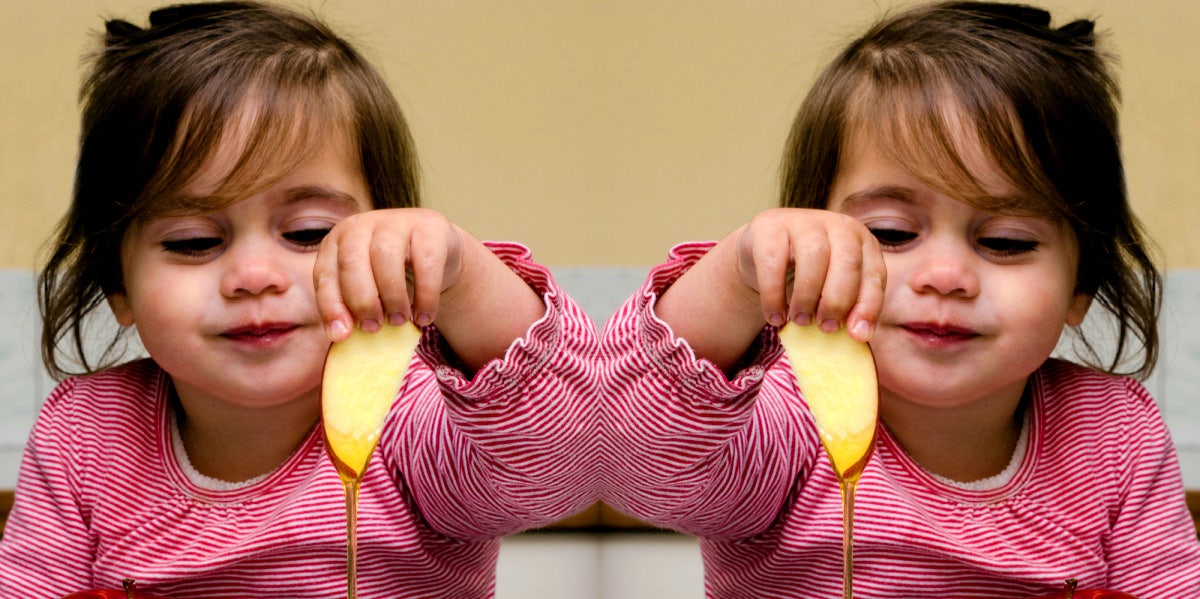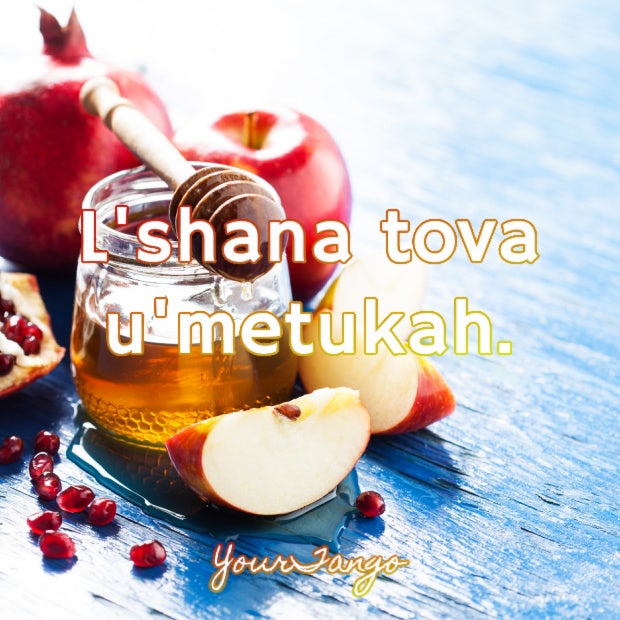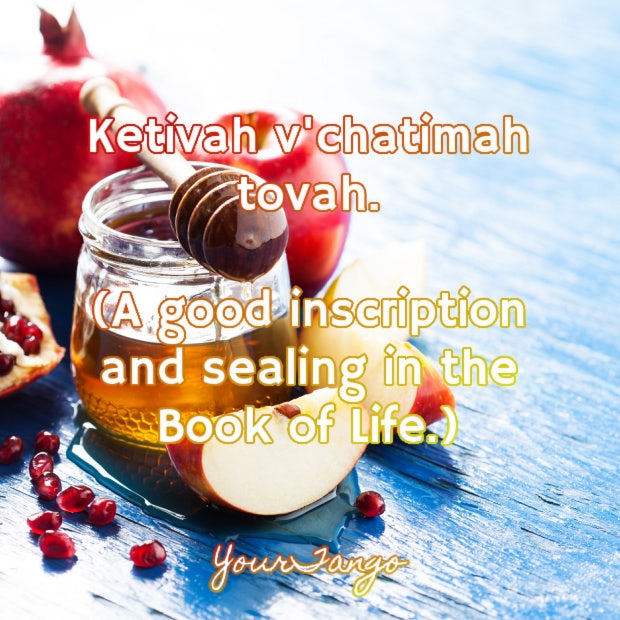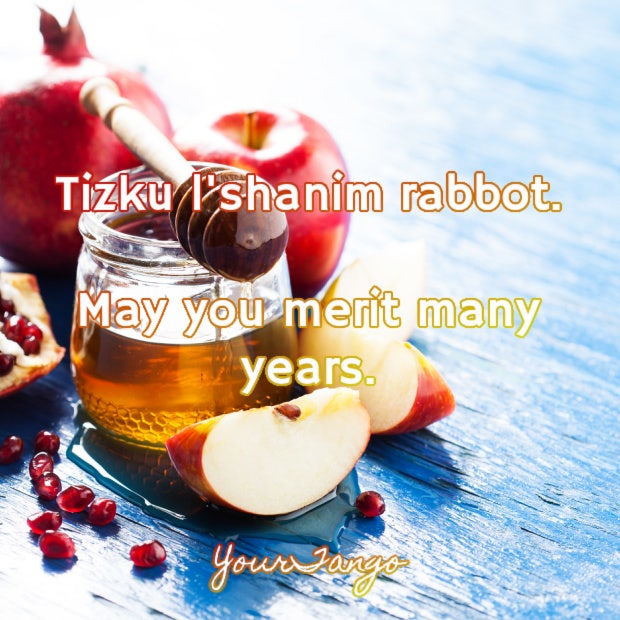How To Greet Someone On Rosh Hashanah To Wish Them A Happy Jewish New Year
Shana tova!
 ChameleonsEye/Shutterstock
ChameleonsEye/Shutterstock Monday, September 6 marks the beginning of Rosh Hashanah, or erev (eve of) Rosh Hashanah. While the year may be 2021 here in the US, as we enter the eve of the Jewish New Year on the Hebrew Calendar, the year 5782 begins at sundown on the first day of the month of Tishrei.
Rosh Hashanah is the only major Jewish festival observed for two full days both in Israel and anywhere else outside of Jews' indigenous, ancestral homeland, ending once three stars are out after sunset on Wednesday, September 8. This was established so the community can be assured the High Holiday hasn't finished until after the New Moon.
While most people are aware that it's appropriate to wish their Jewish friends a Happy New Year on Rosh Hashanah, you may hear some additional words of greeting or Rosh Hashanah messages on Instagram, Facebook and Twitter posts you don't understand or know how to respond to.
What is the proper greeting for wishing someone a Happy New Year on Rosh Hashanah?
The most common greeting for Rosh Hashanah is "Shana tova," which means "Good year" in Hebrew and is the equivalent of wishing someone "Happy New Year" on January 1.
You will also hear people say a few additional versions of Jewish New Year greetings.
"Shana tova u'metukah" means "a good and sweet year," while "L'shana tova" means "to a good year," and "L'shana tova u'metukah" means "to a good and sweet year."
You can also say "Chag sameach," which means "Happy Holiday."
Many Ashkenazi Jews also have a tradition of greeting each other in Yiddush with "Gut yontif," which means "good holy day" or "a gut yor," which means "a good year."
Sephardic Jews will say "Tizku l'shanim rabbot," which means "May you merit many years," to which one answers "N'imot v'tovot," meaning "Pleasant and good ones."
More observant Jews will often greet one another with "Ketivah v'chatimah tovah," which means "a good inscription and sealing [in the Book of Life]," or with "L'shanah tovah tikatevu v'tichatemu," which means, "May you be inscribed and sealed for a good year."
After Rosh Hashanah ends, Jews greet one another with "G'mar chatimah tovah," which means "a good final sealing." This phrase is used until after Yom Kippur, at which point the phrase "Gmar tov," meaning "a good conclusion," is used until the end of the holiday of Sukkot.
Rosh Hashanah Traditions
Observant Jews spend much of the first night and the two days of Rosh Hashanah in synagogue. As long as Rosh Hashanah does not fall on Shabbat (the Jewish word for Sabbath), the shofar — a sort of trumpet made from a ram's horn — will be sounded during the services.
Families and friends also gather for special Rosh Hashanah meals, which are know for featuring a sweet round, crown-shaped challah (braided ritual bread) and apples dipped in honey.
On the afternoon of the first day of Rosh Hashanah, Jews take part in a ritual known as "Tashlich," which means "casting off" in Hebrew. The ceremony takes place at a body of running water, into which Jews throw bread crumbs or pebbles used to represent their sins in a symbolic act of throwing away the last year's wrongs and promising to do better in the year ahead.
If you want to wish your friends and family a Happy Rosh Hashanah on social media, here are some appropriate Jewish New Year quotes you can feel free to use.
Rosh Hashanah Greetings and Quotes
1. "L'shana tova u'metukah."
 Photo: Natalia Van Doninck/Shutterstock
Photo: Natalia Van Doninck/Shutterstock
2. "May it be Your will, Lord our God and God of our ancestors, that you renew for us a good and sweet year." — Traditional blessing
3. "For many Jews, Rosh Hashanah and teshuvah are annual reminders of the possibility to renew relationships with God and with each other." — Rebecca Missel
4. "Ketivah v'chatimah tovah a good inscription and sealing [in the Book of Life)."
 Photo: Natalia Van Doninck/Shutterstock
Photo: Natalia Van Doninck/Shutterstock
5. "Rosh Hashanah is about relationships. Whether between individuals and the God in whom they believe, communities and the traditions which define them, or simply between individuals, whether any God or tradition is part of their lives, it’s all about sustaining relationships which sustain us and help us do the same for others." — Rabbi Brad Hirschfield
6. "Jews, for all their supposed ‘tribalism’ are deeply universal. [Our] new year celebrates not the beginning of Judaism but the beginning of the world." Rabbi David Wolpe
7. "Tizku l'shanim rabbot. May you merit many years."
 Photo: Natalia Van Doninck/Shutterstock
Photo: Natalia Van Doninck/Shutterstock
8. "The blessing over the blowing of the shofar on Rosh Hashanah refers to the mitzvah as “hearing the voice of the Shofar,” but since that voice speaks without words, the message that is heard depends a great deal on who is doing the listening." — Douglas Aronin
9. "During Rosh Hashanah, Jewish people ask God for forgiveness for the things we’ve done wrong during the past year. We also remind ourselves not to repeat these mistakes in the coming year. In this way, Rosh Hashanah is an opportunity to improve ourselves. It’s a holiday that helps us to become better people." — Tori Avey
Deputy Editor Arianna Jeret, MA/MSW, has been featured in Cosmopolitan, The Huffington Post, Yahoo Style, MSN, Fox News, Bustle, Parents and more. Find her on Twitter for more.
